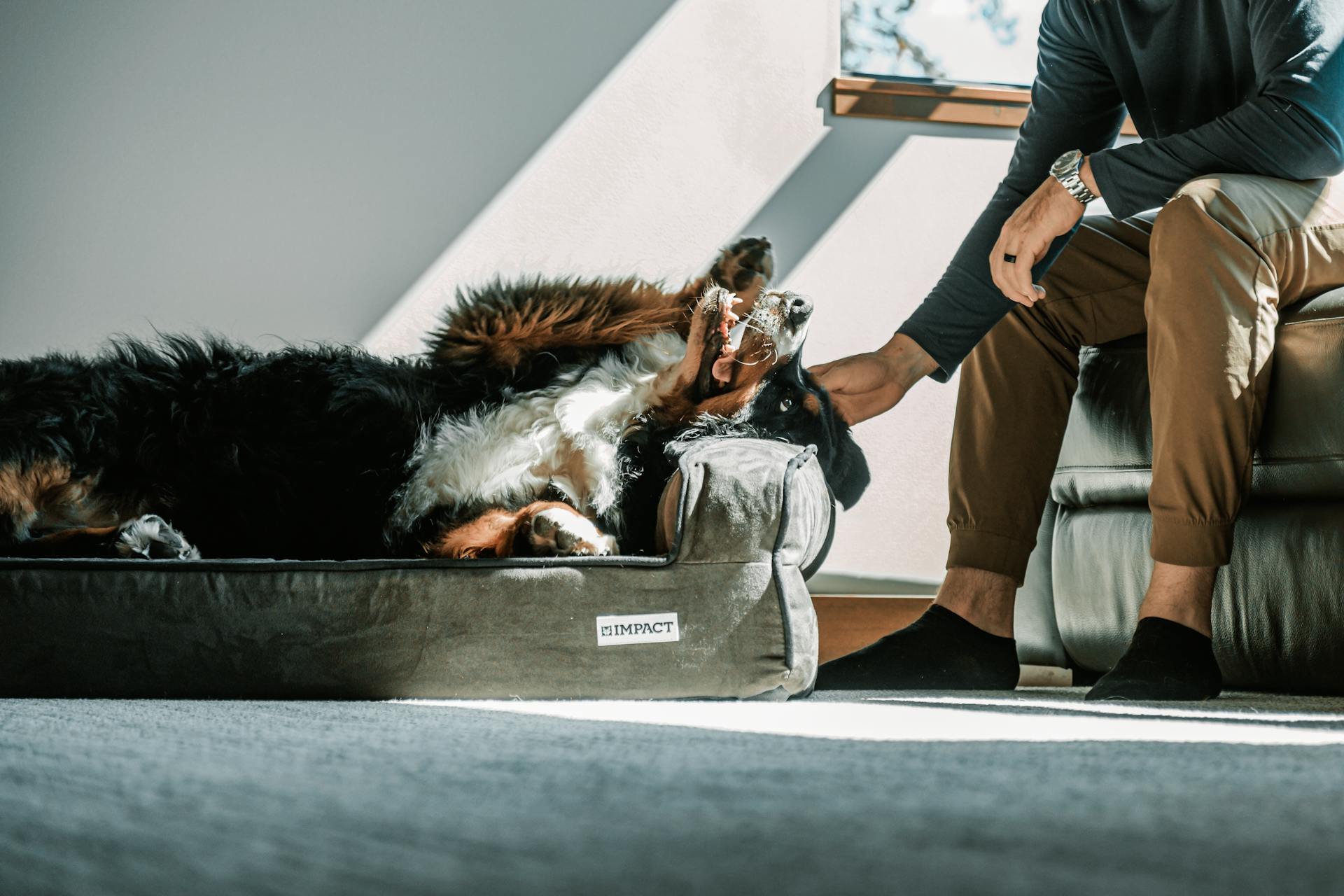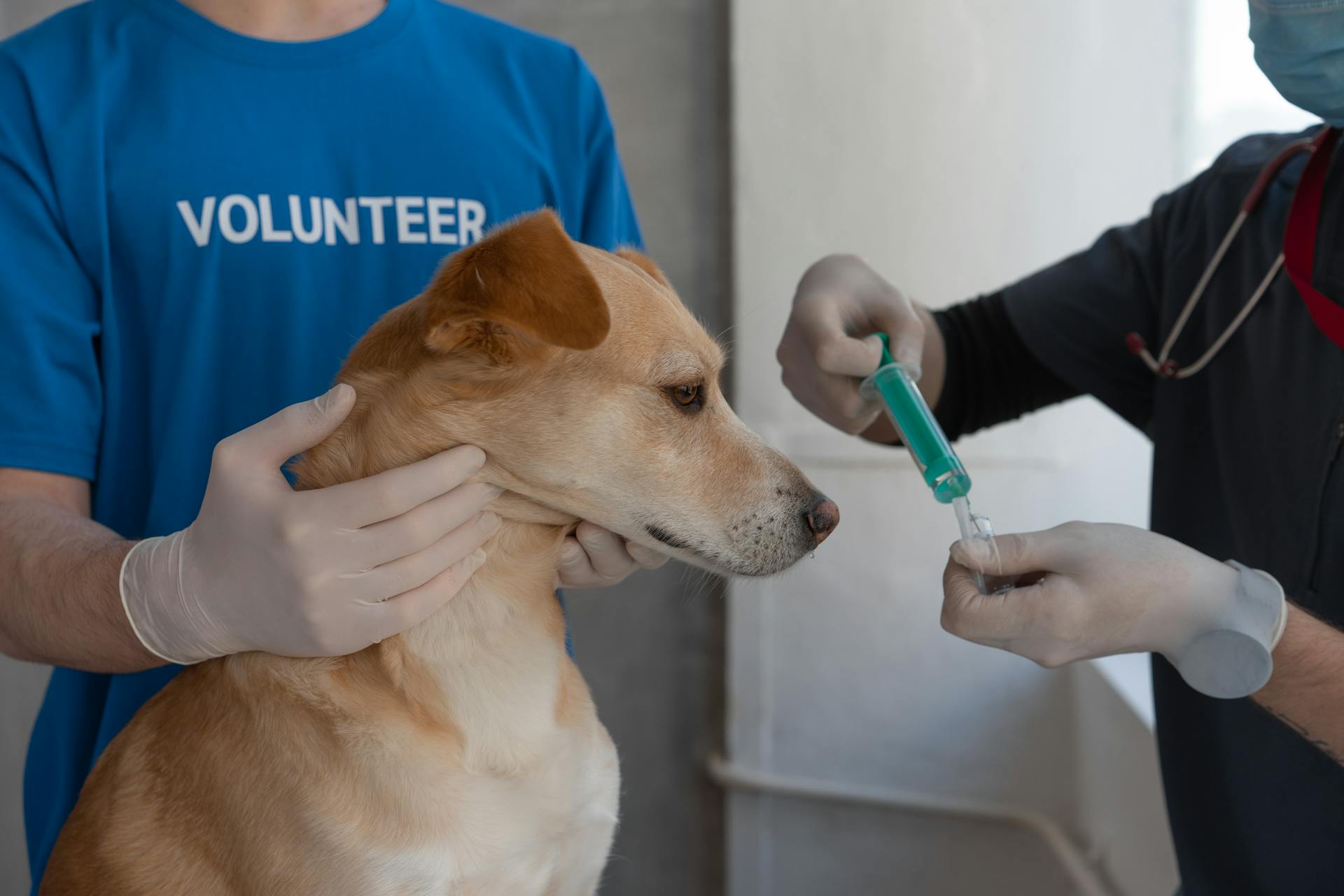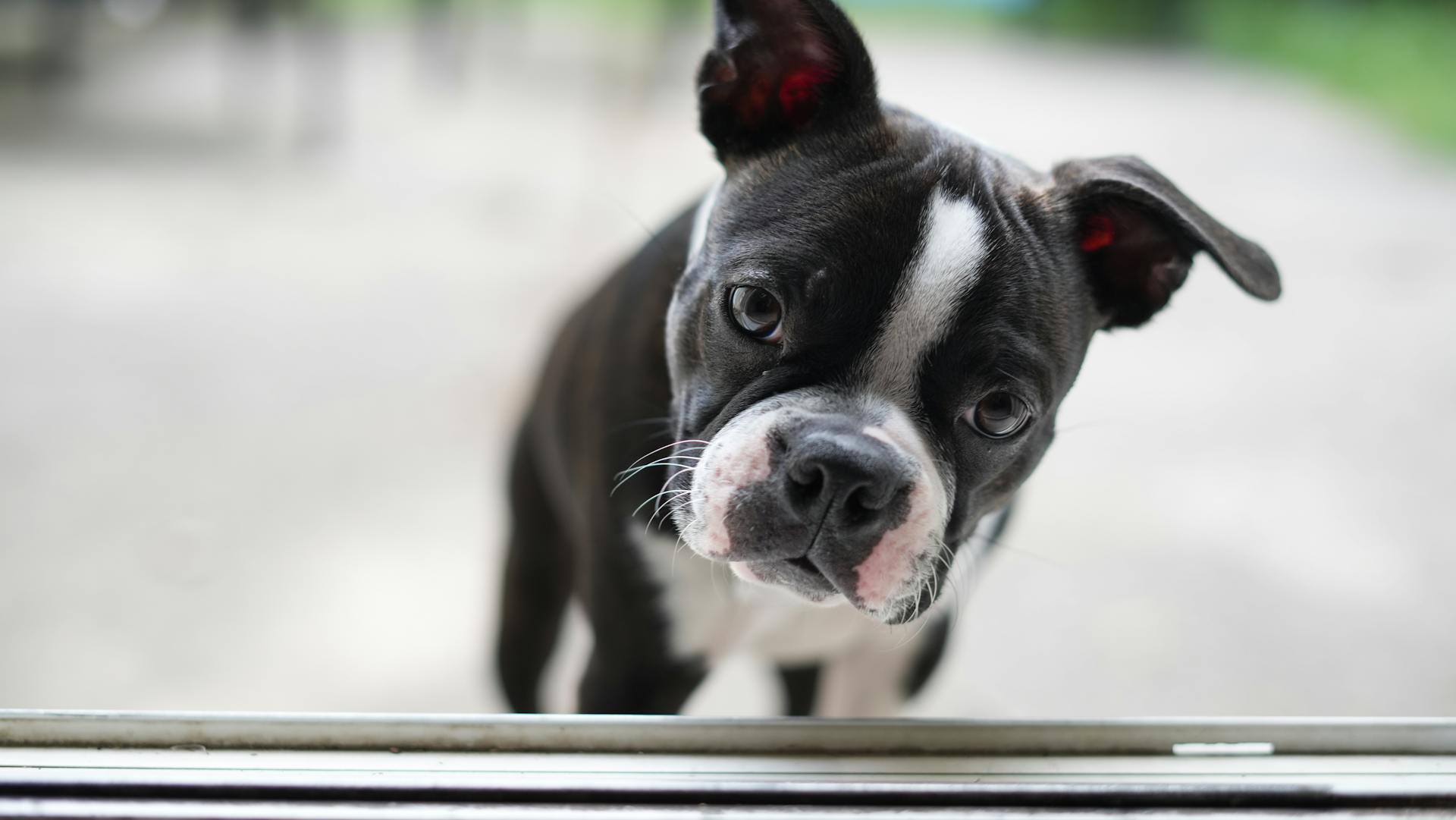
Dog diarrhea can be a real pain for both you and your furry friend. It's a common issue that affects many dogs, and it's essential to understand the different types and their effects to provide the best care.
Dogs can experience acute diarrhea, which is a sudden onset of loose, watery stools that can be bloody. This type of diarrhea can be caused by eating something bad, like spoiled food or a toxic substance.
Chronic diarrhea, on the other hand, is a persistent issue that can last for weeks or even months. It's often associated with gastrointestinal problems, such as inflammatory bowel disease or gastrointestinal foreign bodies.
The frequency and consistency of diarrhea can also vary, with some dogs experiencing diarrhea multiple times a day, while others may only have it a few times a week.
Causes and Determination
Determining the cause of diarrhea in dogs is crucial to providing effective treatment. Your veterinarian will typically request a sample of fresh fecal material to examine.
The nature of the diarrhea, including its color, consistency, smell, and frequency, plays a significant role in determining the cause. Your veterinarian will also ask you a series of questions to help narrow down the possible causes.
Mild cases of diarrhea may not require further diagnostic testing unless initial treatment fails or the condition worsens. Additional tests may include blood work, stool and rectal swab samples for parasite examination, DNA testing, bacterial culture, radiographs, ultrasound, and endoscopic exam.
If your dog has diarrhea, it's essential to observe their behavior and appetite to help determine the underlying cause. This can include changes in their stool quality, vomiting, or lethargy.
Here are some common causes of diarrhea in dogs:
- Consuming food that irritates their stomach
- Sudden changes in diet without a transition period
- Eating human food or garbage
- Rejecting nutritionally inadequate foods
- Parasitic infections, such as worm infestations
- Bacterial infections from eating or inhaling foreign substances
Your veterinarian will work with you to determine the underlying cause of your dog's diarrhea and develop a treatment plan to help alleviate their symptoms.
Symptoms and Effects
Diarrhea in dogs can be a real mess, both for the dog and the owner. The symptoms are often obvious, but it's essential to pay attention to them to determine the cause and severity of the issue.
Loose stools or watery diarrhea are the most common symptoms, which can lead to dehydration if left untreated. Dogs may also vomit, especially if the diarrhea is caused by a foreign body or infection.
In severe cases, diarrhea can cause electrolyte imbalances, which can be life-threatening if not addressed promptly. It's crucial to monitor your dog's behavior and physical condition closely, as diarrhea can lead to lethargy, loss of appetite, and even collapse.
Here are some common effects of diarrhea in dogs:
Bowel Movement Frequency
Small amounts of poop with straining, several times in an hour, can be a sign of inflammation of your dog's large bowel.
Three or four dog poops with large volume suggest small bowel disorder.
If your dog is pooping too frequently, it could be a sign of a larger issue, so keep an eye out for any changes in their behavior or health.
Additional reading: Small White Dogs Breeds
Effects
If you're dealing with diarrhea in your furry friend, it's essential to understand the effects it can have on their overall health. Dehydration is a significant concern, especially in young, old, or frail animals.
The frequency and volume of bowel movements can lead to dehydration, which can be life-threatening if not addressed promptly. Diarrhea can cause electrolyte imbalances, particularly potassium loss.
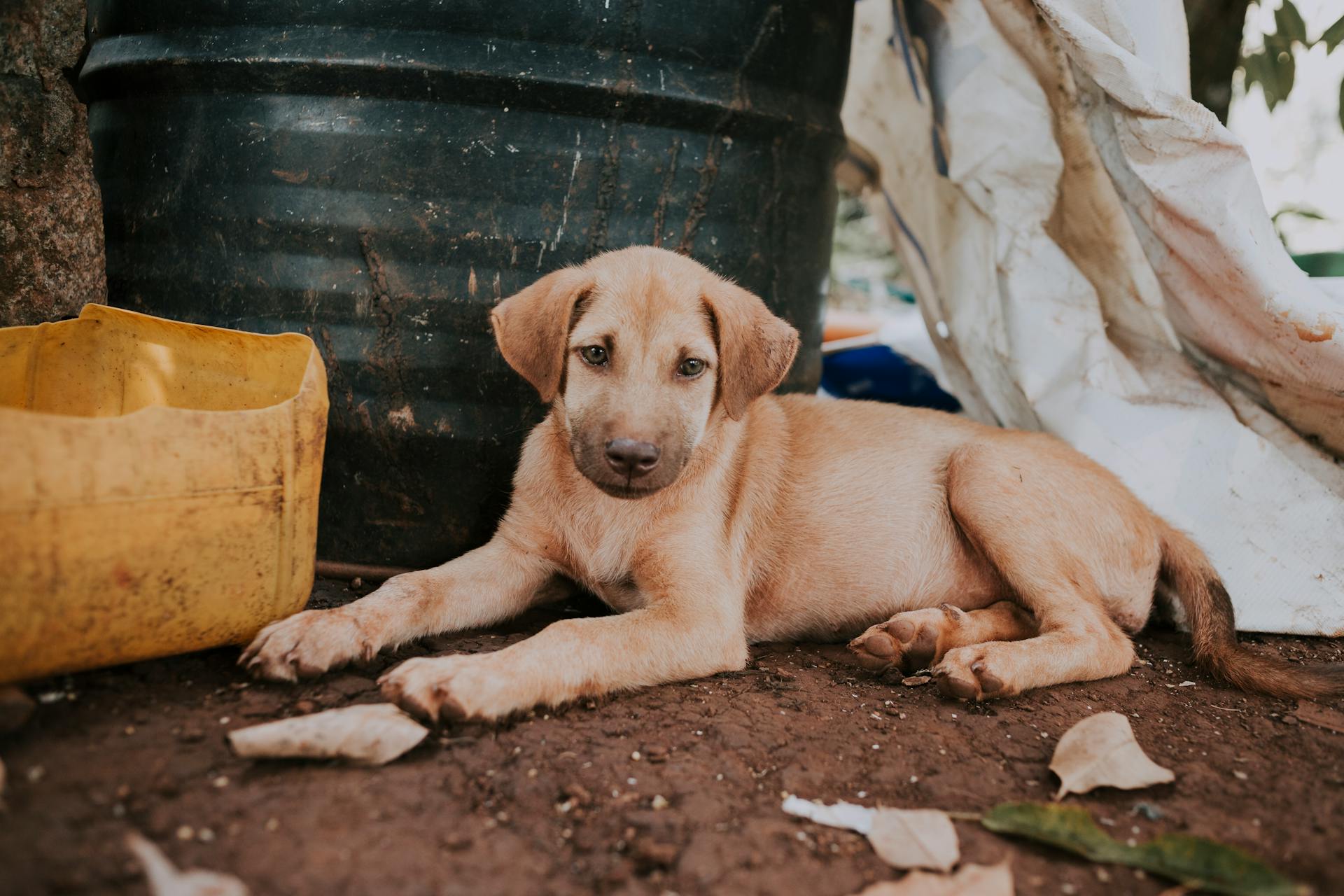
Some animals may experience weight loss due to malabsorption of nutrients. Diarrhea can also lead to a decrease in appetite, further exacerbating the issue.
Here are some potential effects of diarrhea on your pet:
If left untreated, diarrhea can lead to more severe complications, so it's crucial to seek veterinary attention if your pet's symptoms persist or worsen over time.
Treatment and Relief
If your dog has diarrhea, it's essential to determine the underlying cause before starting treatment. A veterinary hospital visit is necessary to bring a stool sample for testing, which may include fecal tests for parasites, radiographs (x-rays) for blockage suspicion, and bloodwork for systemic illness concerns.
Your veterinarian may prescribe deworming medications if parasites are present or suspected. Most cases of acute diarrhea are treated with a bland, digestible diet, such as a prescription veterinary gastrointestinal diet, which is specifically formulated for easy digestion to support GI health.
A "wait-and-see" approach can be taken if your dog is healthy and showing no other signs, with food withheld for 24 hours and water restricted to small drinks. Afterward, offer bland food like boiled, skinless chicken and white rice.
Here are some common dog diarrhea treatments:
- De-wormers, antibiotics, vitamin or enzyme supplementation, steroids, or a diet change may be prescribed by your veterinarian.
- Over-the-counter dog diarrhea treatments, such as those containing kaolin and pectin, can help absorb and remove bacterial toxins and soothe gastrointestinal membranes.
- Probiotics promote the growth of good bacteria in your dog's colon, and can be found in foods like plain yogurt or in supplement form.
Some simple foods can help normalize stool consistency, including boiled white rice, pumpkin, plain yogurt, and boiled potatoes without skin.
Treatment
If your dog is experiencing diarrhea, treatment will depend on the exact cause, so be sure to bring a stool sample to the vet for analysis.
A bland, digestible diet, such as a prescription veterinary gastrointestinal (GI) diet, can help support GI health and is often prescribed by veterinarians.
If parasites are present or suspected, deworming medications may be prescribed, and your vet may also send you home with a veterinary probiotic to help restore balance to your dog’s GI tract.
In some cases, anti-nausea medications, anti-diarrheal medications, or other gastroprotectants may be prescribed, and if your dog is dehydrated, they may receive fluids.
On a similar theme: Vet Dogs Dog Treats
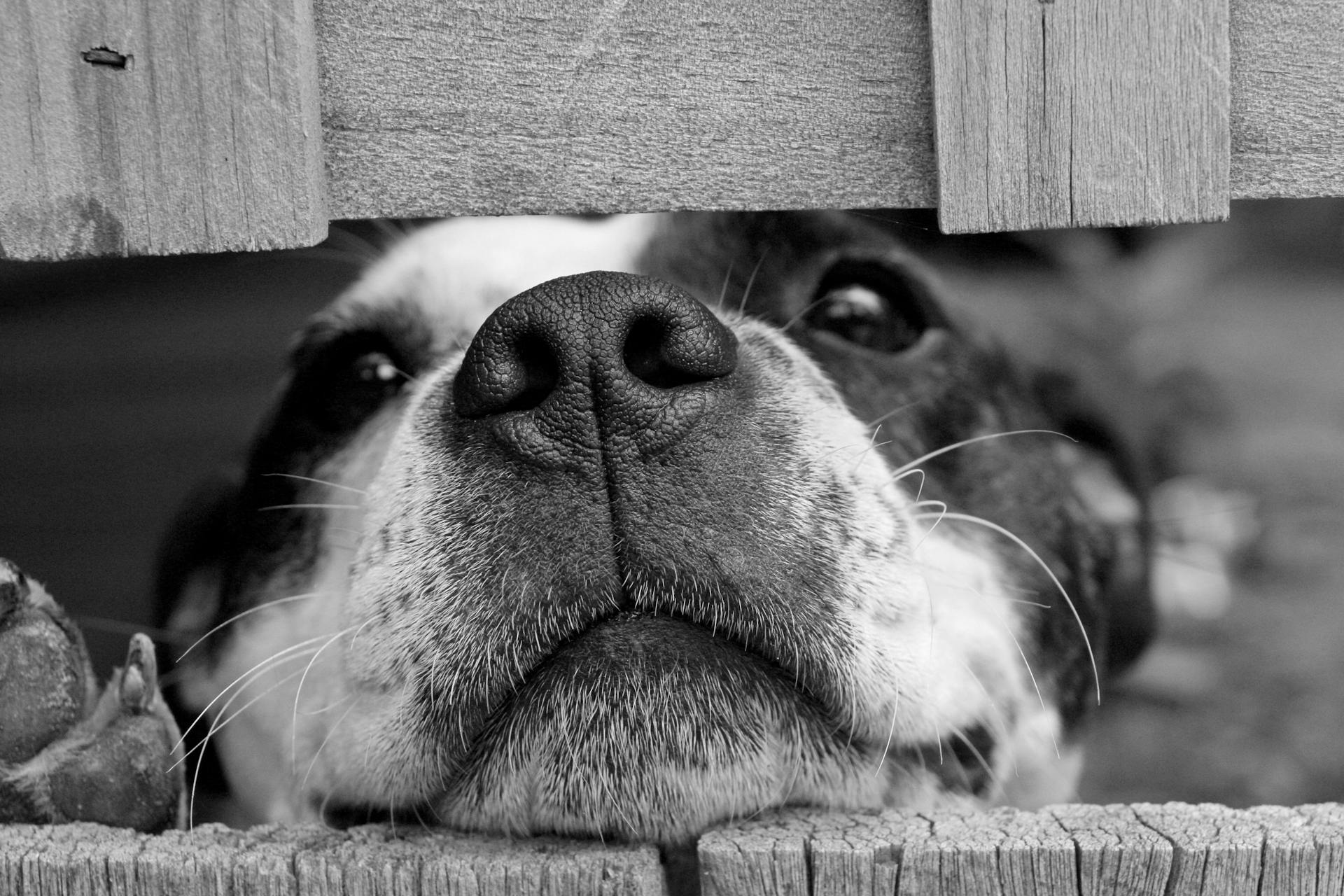
You can also try withholding food for 24 hours and restricting water to small drinks every few hours, then offering bland food such as boiled, skinless chicken, and white rice.
If your dog has diarrhea lasting over 24 hours, or is showing additional clinical signs such as vomiting, fever, blood in the stool, distress, lethargy, decreased appetite, or weight loss, seek veterinary care and bring a stool sample for testing.
Here are some common ingredients found in dog diarrhea treatments:
- Kaolin: helps absorb and remove bacterial toxins
- Pectin: detoxifies, coats, and soothes gastrointestinal membranes
- Probiotics: promote the growth of good bacteria in your dog’s colon
If your dog’s diarrhea responds to a bland diet, you can try introducing simple foods such as boiled white rice, plain cooked white rice, pumpkin, plain yogurt with active cultures, or boiled potatoes without skin.
If your dog has an allergy or intolerance to one of these foods, avoid the problematic ingredient to prevent further upset.
A fast of 12 to 24 hours, with frequent provision of fresh, clean water in small amounts, can help clear the cause of the digestive upset and allow your dog’s gastrointestinal tract to settle.
However, be sure to consult your vet before fasting your dog, especially if they are a puppy, elderly, or small dog, as they may not be able to handle it.
To maintain electrolyte balance, you may offer diluted unflavored Pedialyte under a vet’s advice, but only if necessary.
Take a look at this: Dogs Eat Jasmine Rice
What to Avoid:
When treating your dog's digestive issues, it's essential to avoid certain human medications that can be harmful or ineffective. Never try human medications such as Pepto Bismol (bismuth subsalicylate) or Imodium (loperamide) unless directed by a veterinarian, as they can be harmful to certain dogs and may not pair well with other medications.
Always consult with your veterinarian before giving your dog any medication or supplement. They can help you determine the best course of treatment and ensure your dog's safety.
Outlook and Prevention
The outlook for dogs with diarrhea can vary depending on the severity of the condition. Most cases of simple diarrhea will make a full recovery.
In general, dogs with chronic diarrhea may require ongoing management to keep the condition under control. This can involve dietary changes or medication to prevent recurring episodes.
If your dog is prone to diarrhea, making some simple changes to their diet can help prevent future episodes. This may include feeding a more easily digestible food or adding fiber supplements to their meals.
With proper treatment and care, many dogs can make a full recovery from diarrhea. However, in some cases, chronic diarrhea can be a persistent issue that requires ongoing management.
Frequently Asked Questions
What if my dog has diarrhea for 3 days but acting normal?
Seek veterinary care if your dog's diarrhea lasts for 3 days or more, even if they appear healthy otherwise. Consult a vet to rule out any underlying issues
What is the difference between soft stool and diarrhea in dogs?
Diarrhea in dogs is characterized by abnormally loose stool that's hard to pick up, indicating the colon isn't functioning properly. Soft stool, on the other hand, is still firm enough to be picked up, but may still be a sign of digestive issues.
Sources
- https://cvhcp.com/blog/my-dog-has-diarrhea-but-is-acting-fine-what-do-i-do/
- https://vcahospitals.com/know-your-pet/diarrhea-in-dogs
- https://www.vet.cornell.edu/departments-centers-and-institutes/riney-canine-health-center/canine-health-information/diarrhea
- https://www.amcny.org/pet_health_library/diarrhea-causes-and-treatments/
- https://www.akc.org/expert-advice/health/dog-diarrhea/
Featured Images: pexels.com
